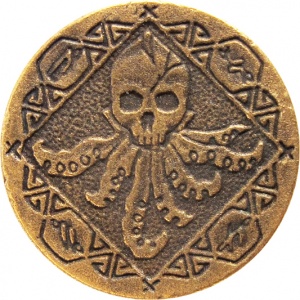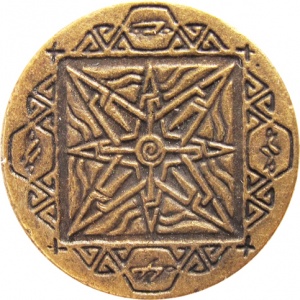Mishanter Coin
- Roma-SPQR- Todesstadt
Contents
Obverse

A dark equilateral diamond field spanning nearly the entire width of the coin.
The area outside of the field features line-art decorations. Covering almost
all of its area, the field includes a vertically oriented skull with 7 tentacles
below, growing out of and obstructing the skull's lower jaw. The tentacles are
depicted with suction cups. The skull contains a Y-shaped diagonal crack spanning
from the bridge of the nose to above the right temple (frontal viewing). There
appears to be a wedge sticking out of the skull's crown.
Reverse

The reverse contains a square with external line-art decorations, which are identical
to the ones featured on the obverse, only rotated 45° clock-wise. The square contains
a vertical stylized 4-pointed star partially superimposed over a another stylized
4-pointed star placed diagonally. The center of the vertical star features an anti-clock-wise
spiral with 2.5 revolutions. The remainder of the central square is filled with wavy decorations.
Edge
The edge is smooth.
Observable Clues
On both the obverse and reverse sides of the coin are four unidentified runes. On the obverse they
are located in the upper left-hand quadrant, the upper right-hand quadrant, the lower left-hand
quadrant and the lower right-hand quadrant. On the reverse side the runes are located at the cardinal
points and lie at a precise forty-five degree angle to the runes on the obverse side. The runes
themselves are similar to the Elder Futhark, but differ in significant ways.
The first rune is called the Northern Rune is located in the upper left-hand quadrant on the obverse
and at the northern cardinal point on the reverse, it resembles the Uruz rune, but lying on its side.
In the Futhark it symbolizes courage and strength, but turned on its side it seems to imply the weakening
of both.
The second rune is called the Eastern Rune is located in the upper right-hand quadrant on the obverse
side and at the eastern cardinal point on the reverse, it resembles the Jera rune, but turned inside-out.
In the Futhark it symbolizes the processes of gain and growth which have been reversed to become loss and
decay.
The third rune is called the Western Rune and it is located in the lower left-hand quadrant of the obverse
side and at the western cardinal point of the reverse side of the coin. This rune most resembles Sowilo the
rune of sun and good-fortune, but whose central line is broken which leads to dark times and ill-luck.
The fourth rune is called the Southern Rune and is located in the lower right-hand quadrant of the obverse
side and at the southern cardinal point of the reverse side of the coin. The Southern Rune symbolically
shares qualities to both Nauthiz the rune of necessity and constraint and Laguz the rune of healing
and life-force, but in both cases the rune has been perverted with slash that changes its meaning into
inhibitions unleashed and unnecessary excess or the reversal of healing into wounding or killing and the
antithesis of life-force, death or perhaps un-life.
Galchobharian Interpretations of the Fourfold Curse
Yvad: Cowardice & Weakness
In General: The first rune is called the Yvad or the Northern Rune and looks like a lazy Uruz from the Elder Futhark.
The Uruz of the Futhark symbolizes courage and strength, but Yvad is a corrupt rune symbolizing the perversion of courage and the weakening of strength.
In most cases the perversion of courage becomes either cowardice or suicidal heroism. As with most curses the victim's strength of personality can create unique variations of the malediction.
Morpheus Specifically: As a god Morpheus' divinity warps the Curse of Yvad giving it a subtly different meaning and attacking his heroic drive and perverting it into a lust for vengeance.
In situations where personal valor becomes relevant, Morpheus' Valor will fail him and those closest to him will become subject to his gross vengeance.
System: Valor drops to zero and Vengeance rises to 6.
Oifuc: Loss & Decay
In General: The second warped rune is Oifuc, often referred to as the Eastern Rune.
Oifuc most resembles the rune of Jera from the Elder Futhark, but has been turned inside-out perverting it's original meaning from gain and growth to loss and decay.
Sometimes this cursed rune's perversity can evolve into a lust for gain and a wild growth that metastasizes into physical tumors.
Given the original meaning of the Jera rune the variations of cursed mutation are almost infinite. Oifuc almost always causes some form of physical transmogrification.
Morpheus Specifically: The history of the Mischanter Coin and it's cursed runes denotes a divine origin and in Morpheus' case it results in the loss of access to divine dominions (not divine attributes) and a mutation of his feathery wings into those of a bat. The god of dreams is attended by a constant smell of bat guano.
System: Morpheus may not access any of his divine dominions until he has rid himself of the Mischanter Coin. The guano-like smell that emanates from Morpheus penalizes him in social situations by two dice with mortals and four dice with those beings who have superior senses.
Eisunk: Darkness & Ill Fortune
In General:
Morpheus Specifically:
Mauwd: Excesses & Wounds
In General:
Morpheus Specifically:
Alias
Cursed Coin of Midir or the Coin of Mischance
History
Features
Country: Éire
Type: Unclassified exonumia
Currency: Éire
Composition: Brass
Weight: 3g
Size: 19.2 mm
Thickness: 1.9 mm
Shape: Round
Orientation: Medal alignment